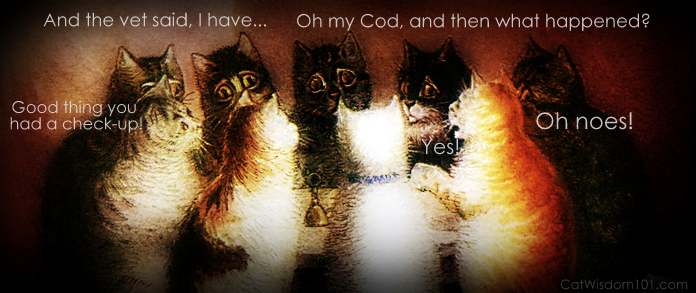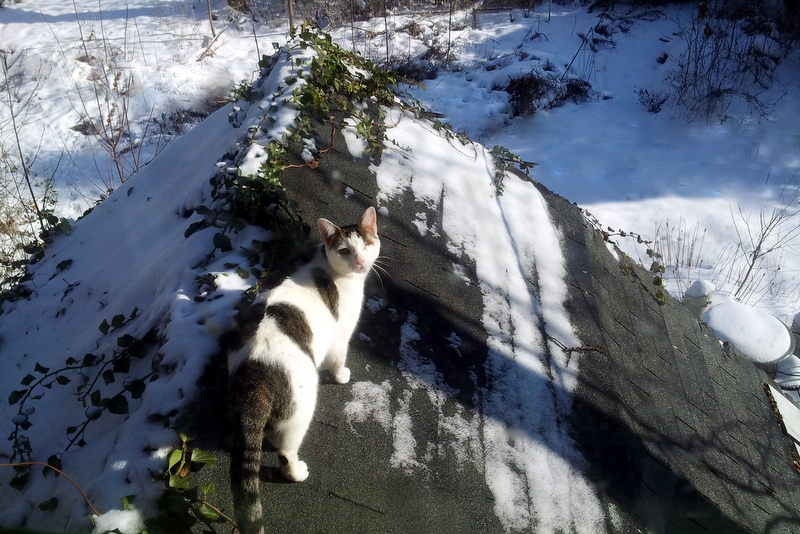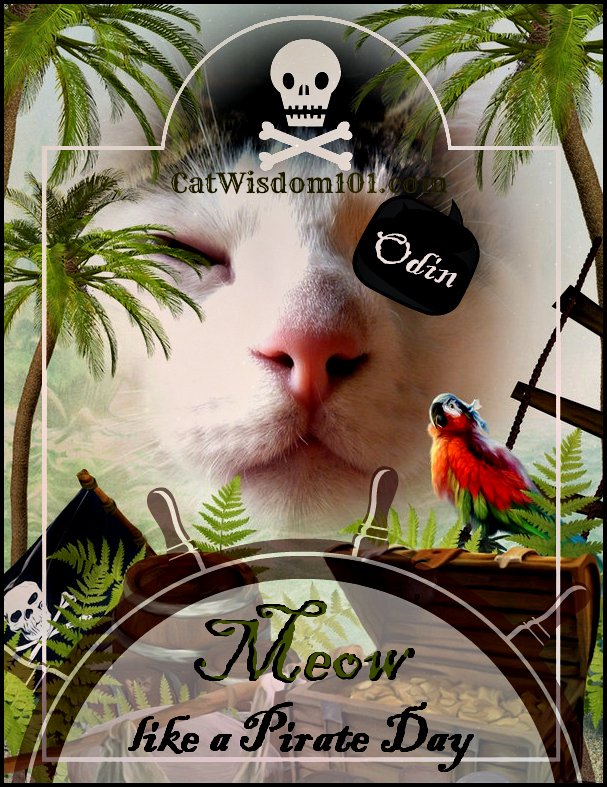Vet 101: Hypercalcemia Too Much Calcium in Cats

Have a Vet 101 Question? Send it to [email protected] with as much detail as possible and a photo.
Where Did All This Calcium Come From? By Dr. Letrisa Miller DVM

Just this week I had yet another cat come through my door with high blood calcium levels, or hypercalcemia. I’ve been seeing this much more in the last year and it has got me thinking about what might be causing the problem in these cats. I have actually seen more cases of hypercalcemia in the last year in my new practice in Connecticut than I saw in the entire 12 years I had my clinic in Oklahoma. Does the problem have a correlation with geographical location? My research shows no studies that address this possibility, so the veterinary community doesn’t seem to have looked at whether or not there could be a connection. The truth is, in most cases, we don’t know what the cause is, so it is very hard to get a handle on what the risk factors might be.
Why is it important if your cat has high calcium levels? The most important reason is that it makes them feel lousy. Just a little extra calcium can severely affect appetite and start causing kidney damage. If calcium levels get too high, the soft tissues of the body also start to calcify, or turn to bone. If a cat’s levels are very high, it will have to be hospitalized and given IV fluids to flush the calcium out of its body until a means of controlling the cause can be found. Hypercalcemia can be life threatening in the short or long term. In the short term it can cause heart arrhythmias and severe kidney damage as well as neurological dysfunction. In the long term it is very damaging to the kidneys and causes kidney calcification and stones as well as damage to many other organ systems.
How is hypercalcemia diagnosed? Routine blood tests are used to measure total calcium levels in blood. Many veterinarians can run this test in their hospital or clinic while you wait. When a high total calcium level is detected, a second test is usually run to confirm that a problem exists. This test is for ionized calcium. Your veterinarian won’t be able to run this test in house, so it has to be sent to a specialized lab and may take some time to get results. If the ionized calcium is high, then most doctors will ask for a parathyroid hormone level and parathyroid-like protein level as well.
If hypercalcemia is confirmed, a reason for the problem is looked for so that an appropriate treatment can be started. This leads to the question: How does hypercalcemia in cats happen?
Several control mechanisms are responsible for calcium blood levels, but I like to think of the problem in terms of the question “where is the calcium coming from?” Extra calcium can be coming from absorption of too much calcium, mobilization of the body’s calcium stores, or failure to remove excess calcium from the body through the kidneys.
The first of these possibilities, too much being absorbed, is most commonly caused by too much activated vitamin D (calcitriol), causing the intestines to absorb too much calcium. When this happens, phosphorus is usually high as well. Hypervitaminosis D has several causes, including exposure to prescription psoriasis cream (Dovonox) or one type of rodent poison. Too much vitamin A can also be a contributor.
Mobilization from calcium stores occurs when there is bone disease like infection, inflammation, or too much parathyroid hormone; it can also occur when cancerous tumors or benign granulomas (inflammatory masses) produce proteins that are similar enough to parathyroid hormone that they act in the same way as the real hormone. In cases with too much parathyroid hormone, phosphorus is usually low.
Failure to remove calcium through the kidneys happens when there is a specific failure of the kidney or a deficiency of mineralocorticoids (hypoadrenocorticism). Mineralocorticoids are made in the adrenal glands along with other hormones such as cortisol and adrenaline. Low sodium and high potassium are usually also found in hypoadrenocorticism cases.
In cats with kidney disease, it can be very difficult to determine if the kidney disease is causing the high calcium, or if the high calcium has caused kidney damage.
The causes of hypercalcemia can be complex and are hard to untangle in many cases. Because of the complexity and confusing nature of calcium controls in the body, I won’t go into the details of figuring out which cause is likely in individual cases.
- The most common cause of high calcium levels in cats is unknown—the medical term is “idiopathic,” and basically it means we’re too idiotic to figure out the cause! Thus, my frustration with hypercalcemia. How do you do anything other than put a bandage on a problem when you have no clue as to the cause?
- One of the recent thoughts about idiopathic hypercalcemia is that the cause might be related to diet, that we might be causing the hypercalcemia by feeding cats a diet that is not similar to what they naturally eat. Because of this, one approach to treatment has been to put cats on homemade high-protein, grain-free diets. Thus far, I have not found much success with this approach, but that may be because most people don’t have the time or inclination to cook for their cats. (That said, two packs of kangaroos are waiting in my kitchen for me to cook food for my multiply allergic cat, Monster. Who says you can’t make time to feed your cats homemade?) The jury is still out on dietary management of hypercalcemia, but it is certainly worth a try.
- Some cats that have granulomatous disease or inflammatory disease will respond to prednisolone therapy, but they tend to require high doses and often the therapy only works for a short time.
- Fosamax, a bis-phosphate that stops breakdown of bone by normal bone cells called osteoclasts is the last line of defense. I have had to resort to this drug in several patients. It is a difficult drug to give because it is caustic and must be given on a totally empty stomach to be effective. This means fasting for 12 hours before medicating and giving lots of water with the pill to make sure that it doesn’t stay in the esophagus and cause damage. Fosamax is not a great option, but it is the only choice we have for those cats that don’t respond to prednisolone or diet change. In human beings who take the drug for many years, one side-effect of Fosamax is brittle bones. Whether extended use of the drug will have the same effect in cats is not known.
- Hypercalcemia, the malfunctioning of the body’s calcium-regulation system, is a symptom of a number of diseases—this is what makes it so frustrating. Treating it successfully is difficult if the underlying cause can’t be found, and if left untreated it results in death in most cases. Idiopathic hypercalcemia is the most common form seen today and seems to be increasing in frequency; it is also by far the most difficult to treat because we can only treat the symptom if we don’t know the cause.
The good news is that hypercalcemia isn’t nearly as frustrating to cat owners as it is to veterinarians, because we do have some effective treatments to keep hypercalcemic cats feeling well for a long period of time. Hopefully our understanding of the reasons cats become hypercalcemic will improve in the near future so that we can better identify and treat it.
For more information and to visit her website, Dr. Letrisa Miller has a feline-only practice in Connecticut




44 Comments
Ginny D
My Bella was diagnosed with idiopathic hypercalcemia 4 years ago. The vet suggested a prescription cat food which is Hill’s w/d. I give her a can during the day and the dry at night (which she loves!). This has been very successful and she is now 11 years old and doing well. This food is very high in fiber and seems to be what works for her disorder. Only problem is that it only has one flavor and she gets bored with it. But, she seems to be healthy and happy which is the main thing! Give this a try and Good luck!
Len
Hello,
I just read that you are giving your cat a dry food and Hills w/d. My cat just recently diagnosed with diabetes.
Please avoid dry foods – give canned foods that are low in carbs, Hills are high. I wish someone told me before that dry foods are not good for cats.
I am just concern… hope all those who read this will start to stop feeding their cats with dry foods..
I am now preparing a homemade chicken for her, and she is taking insulin too.
I am just hoping and praying she gets in remission soon.
Marlene
Great read! I’m actually in CT so it’s nice to see you are local. My 17 year old indoor only cat got diagnosed with hypercalcemia and kidney disease. She is eating like crazy, no sign she is vomiting, but she’s not gaining any weight. She was checked for hyper thyroid but those levels are fine. Any thoughts on the excessive appetite / and no associated weight gain? Is this normal for hypercalcemic cats? Seems they lose appetite vs gain it?
Layla Morgan Wilde
Marlene,sorry she no longer writes for us. Since you are in Ct, I’d contact her directly. Good luck!
pte patch 2018 2.0
Your web has proven useful to me.
Alex
I recently had to put down my 15 year old cat due to hypercalcemia, I was wondering what the signs of hypercalcemia are
Mary Ann
There are MANY articles out there now about how acidifiers put into cat foods are causing hypercalcemia. This started in the 90s as a means to help urinary health in our kitties, but for some it has backfired and many are getting this calcium condition. I had great success in bringing Olive’s calcium numbers way down, but unfortunately her appetite has not improved and is in fact getting worse, suggesting that her calcium receptors might be damaged at this point. There are basically four acidifiers that are the culprit…just Google them for the specific names.
Charles
Would you be willing to share how you brought her numbers down so much?
Mary Ann Farley
Charles, look up “acidifiers in cat food.” You’ll see four chemical names. Simply buy food without these chemicals. One food I found is Orijen Regional Red. Generally, wet foods I found to be acidifier free. Olive’s last calcium levels were completely normal after having been incredibly high. My vet was impressed. My ongoing problem is that she has permanent damage to her appetite, which I haven’t been able to solve .
Amanda
Periactin may help your cat’s appetite. Try heart, chicken, lamb, beef, heart is a lean muscle, high in routine and cats seem to like it. Cut up into tiny pieces.
Len
You may help put fortiflora in her food.. Once she smells that, she will eat the food.
David
My 12 year old was just diagnosed with Hypercalcemia. All tests aren’t yet in but I’m already looking for a low calcium food. The problem is that she will only eat dry food. I put out canned food but she just licks on the gravy. Any ideas? Is there a low calcium dry food?
Layla Morgan Wilde
There’s lots of choices like Wellness. Ask your vet and while transitioning cats off dry is ideal, it can take months to do it gradually. It’s my opinion that wet food is best regardless of the condition. I’m not doing any dietary posts in the near future there are excellent sources online for how to transition cats to wet food. Good luck and let us know the outcome.
Amanda
Vitamin D overdose causes hypercalcemia & high phosphorus, leading to kidney & heart damage, calcification of lung tissue so cats don’t get enough oxygen into their bodies causing further organ damage. Anything above 0.1mg /kg is a serious overdose. Cat foods & vitamin supplements may be responsible.
Kristal Hubbard
My husband took our cat to the vet for her yearly shots. The vet wanted to do blood work on her because our cat is 10 years old. Anyway, the calcium level was 13. The vet would like to re-check in a month to see if the level has dropped. She has a food allergy, so we give her Hill’s Science Diet Venison and green pea d/d. The vet was going to call Hill’s to see if they started putting more calcium in the food, but we haven’t heard back yet. We also give her Whisker Lickens’ crunchy treats (just a few a day for a reward). We give her bottled water and they do add calcium in that also. She’s had this same diet for awhile now, so I’m a little baffled. Reading these other posts makes me know that it happens and it’s hard to determine the cause. Hopefully we’ll find the answers.
Amanda
Check if they put vit d3 into the food, it raises calcium levels causing hypercalcemia in cats & dogs. Best diet is as close to natural birds, rodents, as possible. Lean dark meat, heart meat, similar with some plain grass for roughage or beet pulp. We found out the hard way re vit d poisoning, from vit supplements & food.
Janice Blowers
Betty my blue Ragdoll is on prednisone for high calcium. It seems to do the job but I am worried what else it’s doing. I have it compounded at Pioneer in Vernon,CT. It has been a blessing since it was a horrible sturggle getting meds down. I had it tuna flavored. I had the big test done initially that they sent away. It came back at 13. She had the typical signs that took us to the vet. Once on the tuna stuff she gained almost 2lbs. My vet has tried faithfully to get her on Royal Canin food especially to protect her kidneys. No luck except my other Raggie eats it all. She like others is a very picky eater. Right now all she will eat is Purina’s Wisker Lickins tuna treats. They are addicted to them. Once in awhile some Fancy Feast medley white meat chicken. Really, just licks the delicate sauce. Betty will be 10 in Feb. I was just wondering if you could add anything to her care. She is presently on 0.5ml (5mg) prednisolone once a day. Happy to see you are very close to where I live in South Windsor.
Layla Morgan Wilde
Can you contact Dr. Miller directly? She cannot give veterinary advice online. I will add, cat treats of any kind is not a meal replacement. They usually have a higher salt content.
v nappa
I give my cat Fosamax
v nappa
the Fosamax I use a compounded liquid
Denise
Are you the vet that wrote this article?
Layla Morgan Wilde
Do you have a question?
Denise Dafoe
My cat has a cyst on her parathyroid gland and she has high levels of calcium. She just had the test that gets sent away and we have to wait 5-7 days for the results. The treatment that’s being discussed, once the diagnosis is confirmed, is surgery at Cornell. They are saying the success rate is good and the riskiest time is approximately 4 days after surgery, monitoring her calcium levels. My vet said this is very rare and the cause is unknown. He said he’s only seen 2 cases in 20 years. Have you gleaned anymore information about this? There is so little information available and I want to understand this but I’m finding it very confusing.
Layla Morgan Wilde
Denise, I’m so sorry I have nothing new to add.
Susan
Is fasting required for my cat prior to testing for ionized calcium levels in the blood
darlene konduc
My cat has hypercalcemia. I had to fast my cat before the test.
Janice Murphey
what is the cost of fosamax?
marcy
My lymphoma kitty was in remission and developed high calcium. They had thought it was his kidneys, and pathologist concluded ideopathic. Increasing his Prednisolone did not lower it so they tried a dose of Elspar chemotherapy which knocked it right back. So the cancer was back even though he appeared to still be in remission. He is now on Leukeran, along with his usual prednisolone, and his calcium level is down quite a bit, even a little on the low side.
Deb
One of our cats had a sudden neurological problem a few years ago and the emergency vet found elevated calcium. They thought she had a tumor in her brain. She wound up going through MRI and they checked spinal fluid and no cancer was found. She was treated with prednisolone for inflammation. It took over a year for her to recover and no longer show neurological impairment (her head wobbled all over the place and her balance was uncoordinated – she ran like a drunken person and would run in circles when alarmed). Coincidentally around the same time she had this problem, we had service for water issues in our basement. We have well water. White fuzzy stuff builds up on the ends of pipes and in the pots of plants and we always assumed that was salt from the water softener system. No – the well water service company said the white fuzzy build-up is calcium. Whoa! Our cat had been drinking this water, and she’s always tended to drink a lot of water. Now we don’t know if that was the cause of elevated calcium. But we did switch her and our other cat to bottled water – they no longer drink any tap water from the well – and her calcium level is no longer elevated. I wish we had tested calcium in our other cat at the time to see if his calcium was also elevated and then also declined, it would have been an interesting test. Unfortunately we didn’t do that. I had no idea that water could contain so much calcium to leave build-up on things! So water might be possible source especially if it’s well water not treated …
snickel's mommy
very informative article!
my snick has CRF and our vet has diagnosed her with idiopathic hypercalcemia. we’ll be having the ionized calcium lab work done in january 2014 (next month).
our vet was recommending starting snick on fosamax, but after i did some research on it on the internet i’m uncomfortable with this medication. so i discussed this with our vet and was referred to a clinical nutritionist vet. i’m scheduled to have a phone consultation with this nutritionist tomorrow. i’m hoping to work with her to lower snick’s calcium level through diet, or at least we’ll try to. i’m quite willing to make a homemade diet for snick. but i’m also realistic in that snick is a very picky eater and so my goal is to work on transitioning her to a diet of half homemade and half canned cat food. snick does receive sub-q fluids every other day.
i do wonder whether stress can cause idiopathic hypercalcemia. snick and i have a very quiet and relaxing home, and i run feliway diffusers. but we lost snick’s brother (litter mate) this past april and snick took this very hard. snick also has IBD and she had the worst flare up she’s ever had after we lost her brother. if i remember correctly, snick’s elevated calcium started not very long after we lost her brother.
Church Cat Tom
A very informative article and responses in the comments. I have forwarded this post to my daughter whose kitty has this. The calcium levels are going back up again, so I understand, and causing us to worry.
Skeeter and Izzy
Thanks so much for the info! The more we know the better we can care for our cats.
Luvs Skeeter and Izzy and the Feral Gang >^..^<
Andrea
Thanks for the added info about calcium levels. I’ve been curious about calcium levels since my Lady Butterfly’s level was high this week. Luckily not as high as you’ve mentioned in the comments though. I’ll be keeping your comments as we continue to monitor her blood. She also has kidney disease and hyperthroidism so, as you said, it is all so complicated.
Sue Brandes
I have never heard of this before. Thank you for the post.
Brian
I didn’t know any of that, but that isnpretty routine for me.nnQuite good info though!
Tamago
I’ve never known hypercalcemia…thank you for the information!
Angel Abby
We are at the ionized calcium testing phase with Boo. My only question would be what does the Dr consider as high? This was a very informative article for me as Boo is going through this. The only thing abnormal in her blood work is the calcium level, so I am leaning towards this being idiopathic. All of this is scary.
Letrisa Miller, DVM
Hi Angel,
What constitutes a high calcium is a little bit complicated. It depends on several things.
The first is the laboratory running the assay and what their normals are, as what is normal in one lab can be abnormal in another.
The next is what the cats symptoms are. Some cats have poor appetites, weight loss and increased drinking at levels as low as 12.5 mg/dl, while others remain symptom free up to 15 mg/dl.
The third is what the phosphate level of the cat is. If the product of calcium times phosphorus gets close to 70, mineralization of soft tissues starts to happen.
I personally get very nervous about any cat that has a calcium above 12.5 mg/dl and start recommending ionized calcium testing at that point. The normals for ionzed calcium are much more set and if the ionized calcium is high in a fasting patient, they have hypercalcemia.
Hope that helps. I know it is very confusing!
da tabbies o trout towne
doodz…we love de post header….kinda like a Halloween storee !! thanx for sharin….who new calcium could go crazed on kittehs ….ewe can bet we R gonna knot bee eatin sew much spinach frum now on !! 🙂
Fur Everywhere
Wow, that does sound like a frustrating condition, especially when the cause is hard to determine. It sounds like more research should be done on this particular condition so new treatments and diagnostic tests can be developed.
Kathryn
OH my, I had no idea about this, either. One of my two boyz, Cheddar, developed crystals a year abo and I think this was largely beause I had spent a few weeks giving them fishy treats, which i know can cause crystals. Ched’s bro did not get crystals, but the bro also drinks more water.
The vet prescribed dissolution wet and dry food, and so they have been on that most of the time, and are healthy.
My SIL’s cat ate only commercial dry food and got kidney disease at 12 and that was the end of him.
I await any potential discussion of prevention through diet. Perhaps that is a few years down the line.
I do think that regular commercial pet food is like…..McD’s in that if you eat McD or BK all the time, you will get very ill.
Plant Based Boy
Wow! I did not know that hypercalcemia or this kind of disease for cats even existed. . . Thank you for sharing this. Can you recommend some food sources (Hopefully plant based) for these cute little guys that do offer a more “balanced” approach to calcium intake.
Letrisa Miller, DVM
Sorry, but cats just aren’t good at eating anything plant based that hasn’t been converted to protein by another animal. They have very specialized digestive systems that lack enzymes needed to digest plant materials and that need amino acids and vitamins found only in animal sources.
Many have tried to make a plant-based diet for cats, but none have been completely successful yet. Alas, kitties are meat eaters.
Letrisa Miller, DVM
Oops, should have added that there is a great website for how to feed cats really well. It is:
catinfo.org
This website is from a veterinarian who has done extensive research and study into feeding cats. Great source for how to make a home made diet!